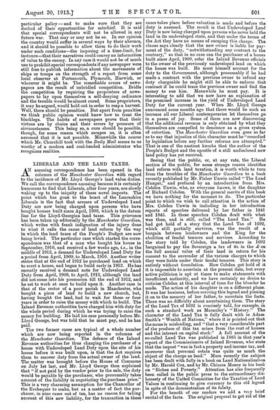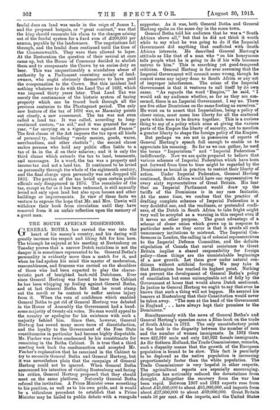LIBERALS AND THE LAND TAXES.
AN amusing correspondence has been opened in the columns of the Manchester Guardian with regard to the incidence of Mr. Lloyd George's land value duties. We call the correspondence amusing because it is certainly humorous to find that Liberals, after four years, are slowly waking up to the iniquity of these novel imposts. The point which has gone to the heart of the Lancashire Liberals is the fact that arrears of Undeveloped Land Duty are now being charged upon persons who have bought houses built since April, 1909, which is the datum line for the Lloyd-Georgian land taxes. This grievance has been taken up editorially by the Manchester Guardian, which writes with frank indignation of the injury done to what it calls the cause of land reform by the way in which the land taxes of the People's Budget are now being levied. The particular case which started the corre- spondence was that of a man who bought his house in September, 1910, and received a few weeks ago, i.e., in the middle of 1913, a demand for Undeveloped Land Duty for a period from April, 1909. to March, 1910. Another writer states that at the end of 1912 he purchased land on which to erect a house, and began to build early in 1913. He has recently received a demand note for Undeveloped Land Duty from April, 1909, to April, 1913, although the land did not come into his possession till the end of 1912, and he set to work at once to build upon it. Another case is that of the rector of a poor parish in Manchester, who bought a piece of land to build a new church, but, having bought the land, had to wait for three or four years in order to raise the money with which to build. The Inland Revenue authorities have charged him with duty for the whole period during which he was trying to raise the money for building. He laid his case personally before Mr. Lloyd George, but was told that he must pay, and he has paid. The two former cases are typical of a whole number which are now being reported in the columns of the Manchester Guardian. The defence of the Inland Revenue authorities for thus charging the purchaser of a house with Undeveloped Land Duty upon the site of his house before it was built upon, is that the Act requires them to recover duty from the actual owner of the land. The matter was brought before the House of Commons ma July 1st last, and Mr. Lloyd George then explained that " if not paid by the vendor prior to the sale, the duty would be payable by the purchaser, who presumably takes account of the liability in negotiating the purchase price." This is a very charming assumption for the Chancellor of the Exchequer to make, but as a matter of fact the pur- chaser, in nine cases out of ten, has no reason for taking account of this new liability, for the transaction in these cases takes place before valuation is made and before the duty is assessed. The result is that Undeveloped Land Duty is now being charged upon persons who never held the land in its undeveloped state, and that under the terms of the Act they have no means of escaping this charge. The clause says clearly that the new owner is liable for pay- ment of the duty, " notwithstanding any contract to the contrary," so that in no case can the purchaser of a house built since April, 1909, refer the Inland Revenue officials to the owner of the previously undeveloped land on which the house was built. He must himself account for the duty to the Government, although presumably if he had made a contract with the previous owner to refund any duty chargeable he might still be able to enforce that contract if he could trace the previous owner and find the money to sue him. Meanwhile he must pay. It is interesting to add that we now have an explanation of the promised increase in the yield of Undeveloped Land Duty for the current year. When Mr. Lloyd George announced some months ago that there would be such an increase all our Liberal contemporaries let themselves go in a paean of joy. Some of them are now discovering that the additional revenue is only obtained by what they themselves are compelled to denounce as a gross system of extortion. The Manchester Guardian even goes so far as to say that injustice of this character must be "remedied by legislation before any further reforms are attempted." That is one of the nastiest knocks that the author of the People's Budget and the apostle of a still undisclosed new land policy has yet received.
Seeing that the public, or, at any rate, the Liberal section of the public, for some strange reason identifies land reform with land taxation, it is worth while to turn from the troubles of the Manchester Guardian to a book recently published by Mr. Fisher Unwin called " The Land Hunger," and prefaced by an introduction from Mrs. Cobden Unwin, who, as everyone knows, is the daughter of Richard Cobden. With the general merits of this book we have nothing for the moment to do. The particular point to which we wish to call attention is the action of Mrs. Cobden Unwin in including in her introduction reports of speeches delivered by her father in 1841 and 1845. In these speeches Cobden dealt with what was then, and is still, called " The Land Tax." He had got hold of a story that the Land Tax of 1692, which still partially survives, was the result of a bargain between landowners and the King for the abolition of feudal tenures and services. According to the story told by Cobden, the landowners in 1692 bargained to pay the Sovereign a tax of 4s. in the £ on the full annual value of their land in return for his consent to the surrender of the various charges to which they were liable under their feudal tenures. This story is entirely without foundation. How Cobden got hold of it it is impossible to ascertain at the present date, but every active politician is apt at times to make statements with insufficient authority, and we have certainly no desire to criticise Cobden at this interval of time for the blunder he made. The action of his daughter is on a different plane. It was her business, before reviving this legend and pinning it on to the memory of her father, to ascertain the facts. There was no difficulty about ascertaining them. The story of the Land Tax of 1692 is concisely told, for example, in such a standard work as Macaulay's " History." The character of the Land Tax is fully dealt with in Adam Smith's " Wealth of Nations," where it is pointed out that the name is misleading, and " that a very considerable part of the produce of this tax arises from the rent of houses and the interest on capital stock." A full account of the so-called Land Tax was published in 1885 in that year's report of the Commissioners of Inland Revenue, who state that the impost "was in fact a property and income tax, and moreover that personal estate was quite as much the object of the charge as laud." More recently the subject has been dealt with fully in a book on Land Nationalization by Mr. Harold Cox, and by Mr. Chiozza, Money in his book on "Riches and Poverty." Attention has also frequently been called in the public press to the extraordinary dis- honesty of the United Committee for the Taxation of Land Values in continuing to give currency to this old legend in spite of the demonstration of its falsity. For the benefit of our readers we add a very brief recital of the facts. The original proposal to get rid of the feudal dues on land was made in the reign of James I., and the proposed bargain, or " great contract," was that the king should commute his claim to the charges arising out of the feudal system for a fixed sum of £200,000 per annum, payable by the landowners. The negotiations fell through, and the feudal dues continued until the time of the Commonwealth. They were then allowed to lapse. At the Restoration the question of their revival at once came up, but the House of Commons decided to abolish them and to compensate the Crown by an excise duty on beer. This was unquestionably a scandalous abuse of authority by a Parliament consisting mainly of land- owners, who ought obviously themselves to have paid the compensation to the Crown. But this incident had nothing whatever to do with the Land Tax of 1692, which was imposed thirty years later. That Land Tax was merely the continuance of the historic system of taxing property which can be traced back through all the previous centuries to the Plantagenet period. The only new feature of the tax of 1692 was, as Macaulay points out clearly, a new assessment. The tax was not even called a land tax. It was called, according to long- continued custom, "an aid," and it was granted for one year, " for carrying on a vigorous war against France." The first clause of the Act imposes the tax upon all kinds of personal ty, including "ready monies, goods, wares, merchandises, and other chattels " ; the second clause makes persons who hold any public office liable to a tax of 4s. in the .2 on their salaries ; and it is only the third clause which extends the tax to land, tenements, and messuages. In a word, the tax was a property and income tax and not a land tax. It continued to be levied on personalty through the whole of the eighteenth century, and the final charge upon personalty was not dropped till 1833. The portion of the tax levied upon certain public officials only disappeared in 1876. The remainder of the tax, except so far as it has been redeemed, is still annually levied not only upon land but also upon houses and other buildings or improvements. In view of these facts we venture to express the hope that Mr. and Mrs. Unwin will withdraw their book from circulation until they. have removed from it an unfair reflection upon the memory of a great man.



































 Previous page
Previous page